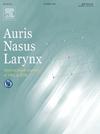Effect of elderly patients with diabetes mellitus on the prognosis of idiopathic sudden sensorineural hearing loss
IF 1.5
4区 医学
Q2 OTORHINOLARYNGOLOGY
引用次数: 0
Abstract
Objective
To examine the influence of diabetes mellitus (DM) and degree of glycemic control on the treatment outcomes of patients with idiopathic sudden sensorineural hearing loss (ISSNHL).
Methods
We retrospectively reviewed the medical records of patients who were diagnosed as ISSNHL between January 2017 and December 2021 at Samsung Medical Center. Patients were divided into three groups by DM and HbA1c result. We compared audiometric outcomes at the time of diagnosis and two weeks and six months after diagnosis according to groups.
Results
A total of 317 patients diagnosed with ISSNHL was included in the present study. The mean age was 55.8 (standard deviation 13.7) years. Baseline hearing at the time of diagnosis on the affected side was 41.3 dB, 56.3 dB, and 62.5 dB for the non-DM, well-controlled DM, and poorly-controlled DM groups, respectively. After six months, the total hearing gain for non-DM, well-controlled, and poorly-controlled DM was 6.3 dB, 7.5 dB, and 8.8 dB, respectively. These were not significantly different. However, as the DM group had higher baseline hearing threshold than the non-DM group, the final hearing in the DM group was worse than that of the non-DM group at all frequencies.
Conclusion
In ISSNHL, the presence of DM and the level of blood sugar control did not affect the degree of hearing recovery. However, patients with DM had poor initial hearing compared to patients without DM, so their final hearing after recovery also was worse.
老年糖尿病患者对特发性突发性感音神经性听力损失预后的影响
目的探讨糖尿病(DM)及血糖控制程度对特发性突发性感音神经性听力损失(ISSNHL)患者治疗效果的影响。方法回顾性分析三星医院2017年1月至2021年12月诊断为ISSNHL患者的病历。根据DM和HbA1c结果将患者分为三组。我们将诊断时的听力测量结果与诊断后两周和六个月进行分组比较。结果本研究共纳入317例ISSNHL患者。平均年龄55.8岁(标准差13.7)。非糖尿病组、控制良好的DM组和控制不良的DM组诊断时患侧基线听力分别为41.3 dB、56.3 dB和62.5 dB。六个月后,非糖尿病、控制良好和控制不良的糖尿病患者的总听力增益分别为6.3 dB、7.5 dB和8.8 dB。这些没有显著差异。然而,由于DM组的基线听力阈值高于非DM组,因此DM组的最终听力在所有频率上都比非DM组差。结论糖尿病的存在及血糖控制水平对听力恢复程度无影响。然而,糖尿病患者的初始听力比非糖尿病患者差,因此他们康复后的最终听力也更差。
本文章由计算机程序翻译,如有差异,请以英文原文为准。
求助全文
约1分钟内获得全文
求助全文
来源期刊

Auris Nasus Larynx
医学-耳鼻喉科学
CiteScore
3.40
自引率
5.90%
发文量
169
审稿时长
30 days
期刊介绍:
The international journal Auris Nasus Larynx provides the opportunity for rapid, carefully reviewed publications concerning the fundamental and clinical aspects of otorhinolaryngology and related fields. This includes otology, neurotology, bronchoesophagology, laryngology, rhinology, allergology, head and neck medicine and oncologic surgery, maxillofacial and plastic surgery, audiology, speech science.
Original papers, short communications and original case reports can be submitted. Reviews on recent developments are invited regularly and Letters to the Editor commenting on papers or any aspect of Auris Nasus Larynx are welcomed.
Founded in 1973 and previously published by the Society for Promotion of International Otorhinolaryngology, the journal is now the official English-language journal of the Oto-Rhino-Laryngological Society of Japan, Inc. The aim of its new international Editorial Board is to make Auris Nasus Larynx an international forum for high quality research and clinical sciences.
 求助内容:
求助内容: 应助结果提醒方式:
应助结果提醒方式:


